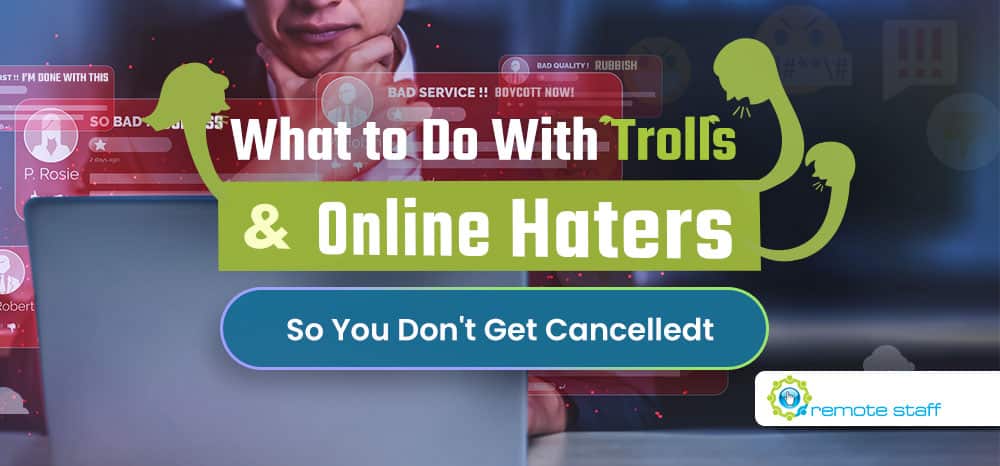Hint: Arguing is not one of them. But we’ll get to that later.
Over the past decade, the internet has served as a great equaliser. It leveled the playing field for small-medium businesses, whose authentic voices gave them an edge over massive companies with equally massive budgets. Social media has also enabled ordinary people to establish credible platforms as influencers. Heck, some of them have greater clout than local celebrities.
Most of all, word spreads fast through the online ecosystem. If a much-hyped product or service doesn’t turn out to be all that or if a promising political candidate was embroiled in scandal, you’ll find out about it soon enough if you’re fairly active on at least one social media platform.
However, there’s a dark side to all of this.
Trolls, Fake News, and Cancel Culture

You know how some people seem to just delight in starting fights online? The ones who’ll post controversial content or inflammatory comments just to get a rise out of you? They’re called trolls.
Most of the time, there’s no rhyme or reason behind their actions. (Though there are a growing number of paid ones, apparently, but that’s for another article.) Some people just want to watch the world burn.
Fake news is the result of people sharing fabricated stories and/or misleading edited images or videos. Sometimes, they do so deliberately to sabotage a person or company, but some users also do so unwittingly.
Cancel culture is when an internet mob clamours to boycott a certain person, brand, or company. This could be due to controversial events or statements, extreme differences in opinion (e.g., political leanings), or a public misstep.
While there could be legitimate reasons behind such outrage, trolls and fake news can sometimes end up in a witch hunt. Often, the hapless target ends up getting the short end of the stick here.
What to Do When The Online Pitchforks Come For You (Or Your Company)
So, how do you deal when you’re facing online haters trying to shut you down? The human impulse would be to argue back, right? Except it won’t help in most cases.
Instead, you can try these:
1. Assess if there is a legitimate complaint or concern.

Before you dismiss inflammatory comments as online hate, take a hard look internally. Where is the vitriol coming from? Is this a customer who got bad customer service? Check the chat messages or logs. Did someone get a defective or damaged product? Investigate and call up your suppliers if there are any issues with raw materials or handling.
Or is this a disgruntled employee with an axe to grind? Did your company recently let go of someone? Were there issues surrounding their dismissal that the company failed to consider?
But if the comments appear to be random and generic (e.g., “______ sucks! You guys should shut down!”), it could just be trolling, which leads us to the next option.
2. If it’s plain trolling, take the high road.

Don’t even try reasoning with trolls. They won’t be swayed. Your audience, however, will be watching how you handle them.
Usually, it’s best to simply ignore trolls. Monitor their posts but avoid dealing with them if you can.
Some companies (or rather, their social media handlers) are quite adept at shutting trolls down with sassy comebacks. This can be great if it fits in with your brand persona, but bear in mind that it could result in more backlash too.
3. Otherwise, respond with grace and take action.

Going back to the first item, if there is a legitimate complaint, address it promptly and gracefully. Acknowledge the error or oversight, apologise for the inconvenience, and then talk about how you’re resolving the issue or are planning to.
If it’s a defective product, offer a free replacement. Bad customer service? Reassure your customers that you’ve advised the erring staff and that you’re monitoring communications to ensure that this never happens again.
Remember, the sooner you own up to a mistake and make amends, the quicker an issue will die down.
Lastly, you can also consider hiring a professional to deal with the fallout. The unspoken rules about what is and isn’t acceptable are changing faster than ever, so it’s easy for anyone or any company to find itself in hot water. And the wrong response can quickly make the situation go from bad to worse.
Social media managers and certain digital marketing specialists won’t just come up with an appropriate crisis management plan. They’ll also help you spot any potential red flags and thus avoid costly mistakes.
Remote Staff has a rich pool of the best Filipino remote talent out there. You can bet that we can come up with just the right person for your company. Thanks to more than a decade’s worth of experience in the remote industry, we can also onboard them for you and take care of tedious things like tracking their hours, arranging for their payroll, and sorting out mandatory government contributions.
That way, they’ll have peace of mind to focus on doing a great job so you’ll have one less thing to worry about.
Click here to give us a call or here to schedule a callback.
Serena has been working remotely and writing content for the better part of the last decade. To date, she's written for Pepper.ph and Mabuhay Magazine, among others, and has churned out more than a thousand articles on everything from The Basics of Stock Market Investing to How to Make Milk Tea-Flavored Taho at home. Hermits, aspiring hermits, and non-hermits with interesting project propositions may email her at serena.estrella10@gmail.com.





















